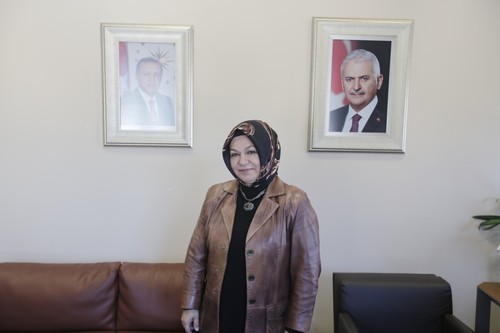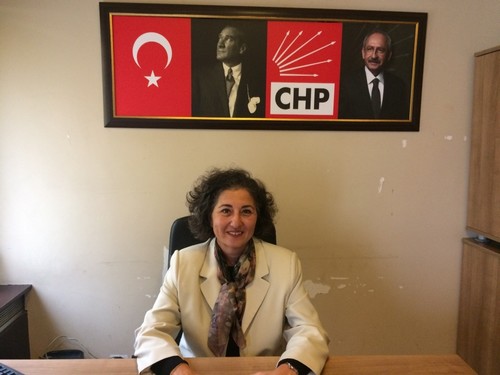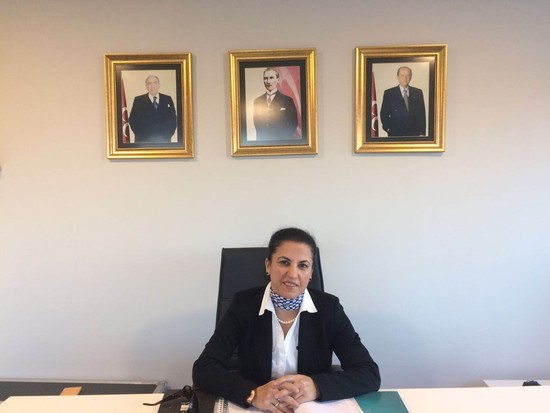© Turkuvaz Haberleşme ve Yayıncılık 2026
The right to run for election and be elected was given to women in Turkey in 1934, making it one of the first countries to grant this right to women. Yet, the country still has the lowest number of females in politics. Despite the many developments implemented to encourage women recently and the fact that all political parties aim to further involve women in their organizational structure, the percentage of women in the parliamentary assembly is still no more than 4 percent. According to the Istanbul heads of the women branches of Turkey's biggest political parties, the main reason for this is women's social and economic struggle, preventing them from having the flexibility to become involved in politics.
Daily Sabah reached out to the Istanbul heads of the women branches of the Justice and Development Party (AK Party), Republican People's Party (CHP) and the Nationalist Movement Party (MHP) and asked for more information about women in politics in Turkey. While agreeing on the fact that the number of women in politics is very small and something must be done to change this, all three leaders of the AK Party, CHP and MHP women's branches stressed that their parties do everything necessary to encourage women to participate in politics and yet, despite all these efforts, they are unable to achieve the desired result. Furthermore, these women also agreed that all females in Turkey suffer more from violence than males and should be given the freedom to act upon their own will, adding that the key to overcoming this problem is to unite as the women of Turkey.
AK Party: Reaching women will result in reaching the whole society

"We, as the women's branch of the AK Party, are mostly involved in activities geared toward voters. If you reach the woman of a family, you can effectively reach the youth and the men of the family as well," said Şeyma Döğücü, the head of the AK Party's women's branch, while describing the duties of the AK Party women's branch.
Turkey's ruling AK Party's organizational structure is based in the capital city of Ankara and, from there, it branches out into every city of Turkey, through which it has organized its local branches. Each branch has its separate women and youth branches as well, which are independent in their internal matters but connected to the main branches in external matters. In Istanbul alone, with 960 neighborhoods and 39 districts, the party has more than 9,000 female members.
Working closely with the Family and Social Policies Ministry, Döğücü said that as the women's branch, they aim to solve the concrete problems of women and provide social assistance as well as education. "There is the AK Party Politics Academy [AKSEM]. It also has a women's academy, where women are provided training once a month on the way the government runs as well as other things such as basic politics," she said, highlighting the importance that her party gives to the education of women. Although there is no official quotas for women in party structure, traditionally, at least the 30 percent of AK Party deputy candidates have been women. In order to achieve the system they have today, Döğücü said they went to the Netherlands to see how that country has managed to integrate women into politics, doing so before founding the party's organizational structure. "Now, people come from other countries to examine the structure of our party," she added proudly, also saying that it is an advantage to be a woman in the AK Party since women who serve also have the opportunity to serve in politics. "When you do your work properly, it does not matter whether you are a man or a woman," she further added, saying that women should be in places where they can achieve concrete results. "For example, the Education Ministry should be directed by a woman, as women provide proper educations, as a result, raising better generations," she said. According to Döğücü, the biggest problem facing women in Turkey is unemployment and economic issues. Still, she says that this happens not because the country's economy is in bad shape but because the needs of the people have changed. "Before, children wanted chocolate but now they want a tablet, which makes everything harder economically," she said in order to highlight the issue.
Regarding violent acts against women based on their choice of clothing, Döğücü stressed previous bans on the hijab, saying that in Turkey women suffered immensely from intervention on what they wear. "Yet, we have learned that with violence, nothing can be achieved. We can't aim to be for freedom of thought and at the same time support interference into women's appearances. The words 'violence' and 'women' should not be used together. We have strict laws against violence targeting women but we need to reach the public and teach them how to love. Women are the ones who will bring peace," she said.
On a different note, when asked about how they approach female refugees, Döğücü clearly stated that it does not matter whether a woman is a refugee or not, that they try to reach everyone they are able to help. "No woman desires to be away from home even in the worst conditions. This means that if these women are here, it is because they have no other choice but to be here," she said.
CHP: Number of women in politics increases but struggle to exist in politics continues

Arzu Öner, the head of the CHP's women's branch in Istanbul, emphasizes the importance that her party gives to women by saying that the CHP is the party which supported women first by giving them the chance to become involved in politics. "The CHP is the party that gave women the right to elect and be elected and we, alongside our leader, aim to increase the number of women in our party on a daily basis," she said, adding that they are actually making progress in this respect since they are in a better situation compared the past. "Still," she said, "the struggle for women in politics is also increasing, as women do politics when they have concerns for their society and today they have that concern."
The CHP's headquarters is also in Ankara, but every city has its own party branch and all of these branches have their own women's branch that is connected to the headquarters. The towns in the cities similarly also have their own branches and women's branches.
The main duties of the CHP's women's branch, according to Öner, is to conduct activities that address the problems of women in Turkish society and also have the responsibility to introduce the party to the public to gain public favor, resulting in an election win.
"The responsibility of the party has been in line with how we see our responsibilities in the society. We conduct activities such as courses on the literacy, handcraft to help women connect and make it easier for them to get of the house and socialize," Öner said, adding that according to the party's code, there is the 33 percent quota for women, which means that at least 33 percent of party deputy candidates should be women. Also, she indicated, "During elections, in every electoral district, female candidates from the CHP have been placed on top of the ranks by the CHP authorities to guarantee that they will be elected as deputies."
Stating that as the CHP's women's branch works with multiple nongovernmental organizations (NGOs) and municipalities, Öner further added that they have international connections as well - like the Socialist International. According to Öner, women worldwide experience similar problems and, for this reason, a common language should be found to reach a common solution through such NGOs. "Women's problems are never a priority for men," Öner said, stating that the male-centered perspective of society should change to overcome the problems affecting women.
Yet, when it comes to the biggest problem facing women in Turkey, Öner pointed to violence against women.
"In the last four months, 127 women have been murdered, which means that every day more than one woman is killed. Why is this happening? Because, they decide for themselves. For example, they want to get a divorce and this leads to them being killed by their husband. Yet, this is a personal reason. The social reason behind this situation is the fact that there is no awareness of gender equality," Öner stated.
She went on to say that the difference between women, their appearance, what they wear or how they act is not a problem between women. "This is a problem for men. They use this as a political means for gains. As long as they benefit from these debates, they will not end them. No one can decide what a woman will wear or not, but herself. Women need to learn to act together in this matter. Women are the only ones who can put an end to these discriminatory policies," Öner said, referring to recent acts of violence toward women due to their clothes.
Lastly, Öner described the situation of refugee women as being an example of humanitarian shame. "CHP women reach out to as many women as they can. Peace is another name of women. So, the CHP supports every woman who fled war in their country in search of peace," she said about the issue.
MHP: Returning to our roots would balance the equation between men and women

The organizational structure of the MHP is different from that of other parties, since there is no women's branch separate from the main branch. Gülbeyhan Saylağ, the head of the MHP Istanbul branch committee that is responsible for women and family and is the deputy of the provincial head, says this gives women the freedom to be in every part of the party without any restrictions. For similar reasons, there is no quota stipulated by the party for increasing female participation. Saylağ defines the atmosphere of the party organizations as a family that depends on their ideological unity, which prevents any discrimination between men and women in the party.
"We try to involve women in politics by solving both personal and social problems that may prevent them from working in politics. For example, when a woman has a child to take care of, she brings her child to party meetings and someone from the party takes care of the child while the mother attends the meeting," Saylağ said, regarding the participation of women in the MHP.
She also said there are women's discussion meetings in which the problems of women are discussed and solutions are found.
"The percentage of women in politics in Turkey is 4 percent. The main reason behind this is the fact that Turkish society still does not accept that individuals who have different physiological features can perform the same jobs. How can we overcome this? If we return to our roots in ancient Turkish empires, then the equality between men and women can be established once again. Women should be given the right to act upon their own will," Saylağ said when asked about the low percentage of women in the politics of Turkey.
"The place of women in the political party should be considered the same as their place in society. If women make up 51 percent of the Turkish population, we cannot claim that our democracy is working properly unless this same rate is achieved in the assembly as well. The number of women in our party might be small, but it is not like 500 women have applied and we only chose one of them. Women do not become involved in politics due to the problems they face," she further added.
According to Saylağ, the biggest problem that women face in the world is violence. "What we, as the MHP, understand from violence is that the women do not get same opportunities as men in social, economic and political realms, leading women to be excluded from these worlds. There is physical violence, economic violence and social violence and when all of these come together they cause the political violence," Saylağ said, while indicating that they implement projects that aim to prevent violence before it occurs.
"On March 8, we started a project to create awareness of violence in society and to prevent it with the participation of our party's branch that is responsible for women and family as well as the law branch alongside all the lawyer members of the party," she added, while expressing that there should be a permanent commission in the assembly that is above all political parties to solve this issue.
